Getting around UP

Palacký University Olomouc, as well as Olomouc city, offer a variety of centres and facilities where students, academic workers, guests, and the general public can progress on the basis of educational, cross-cultural, multi-lingual and self-growth abilities, skills and habits for the journey of studies, work or life growth.
Libraries
 Extensive studies and further researches are frequent habits that students and academic workers know by heart. In order to achieve desired quality, a number of verified and reliable articles, limited publications, monographs, educational studies, manuscripts and more by qualified authors are needed.
Extensive studies and further researches are frequent habits that students and academic workers know by heart. In order to achieve desired quality, a number of verified and reliable articles, limited publications, monographs, educational studies, manuscripts and more by qualified authors are needed.
Palacký University Olomouc offers a variety of libraries for students, employees, and guests to use for their research, learning, and reading needs. One of the major libraries is the Zbrojnice Library, serving as the central library for the university.
Zbrojnice Library
The Zbrojnice Library is located in the very heart of the city, making it easily accessible to students, employees, and guests. It offers a wide range of services, including borrowing books, online databases, and quiet reading rooms for study. The library also has a spectacular collection of academic journals, magazines, newspapers, unique collections of rare books, manuscripts and more.
In addition to its extensive collection, the Zbrojnice Library also provides access to digital resources, including e-sources, and online catalogues. The library has a modern and well-equipped study room, which is available to students and employees of the university.
Zbrojnice contacts
Further information about the Zbrojnice Library or its branches can be found on its official website. Students, academics or guests can visit the library directly or contact them through a mobile phone or e-mail. The library's website provides detailed information about its services, collections, and resources.
| Address: Zbrojnice Library, Univerzitní 3, 771 80 Olomouc, Czech Republic |
| Mobile phone number: +420 585 634 111 |
| Email: knihovna@upol.cz |
Branches of the Library
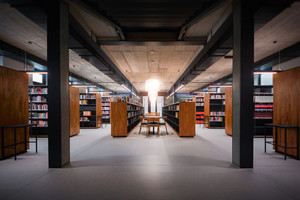 The Zbrojnice Library has several branches located across Olomouc, making it even more accessible to students, employees, and guests. These branches are dedicated to specific subjects, such as law, medicine, and natural sciences, and they offer specialized collections and services to support research in these areas.
The Zbrojnice Library has several branches located across Olomouc, making it even more accessible to students, employees, and guests. These branches are dedicated to specific subjects, such as law, medicine, and natural sciences, and they offer specialized collections and services to support research in these areas.
Other Libraries
 Some customers prefer reading popular novels or need specific texts that can not be found in university libraries. In this particular case, we recommend visiting the City Library of Olomouc or the Olomouc Research Library.
Some customers prefer reading popular novels or need specific texts that can not be found in university libraries. In this particular case, we recommend visiting the City Library of Olomouc or the Olomouc Research Library.
- The City Library provides bibliographic and information services to residents of the city of Olomouc and its surroundings. The following departments are located in the central building of Náměstí Republiky: Department for Children and Youth, Department for adult readers, Rental of music and music carriers, Reading room and study room, and Internet center. In the library, you will meet professional librarians who are always helpful and can give you expert advice.
- Olomouc Research Library is a public library with a rich tradition (founded in 1566) and an extensive library collection covering all subjects (more than 2 million volumes). It is the second oldest and third largest library of its kind in the Czech Republic. It is possible to make a reservation for a title through the Olomouc Research Library database, so its customers do not have to visit other bookstores in the city.
Press, Print and Bookbindery Services
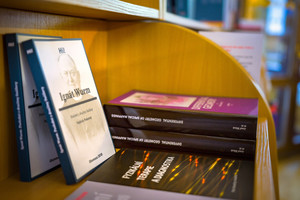 Palacký University offers a range of services related to press services, print services, and binding services. These services are utilized by students and academic staff members on a daily basis. They serve as valuable resources for students and academics, assisting them in organizing, formatting, printing, and binding their final academic works or study materials. Additionally, these services provide access to supplementary literature and create a foundation for potential publications.
Palacký University offers a range of services related to press services, print services, and binding services. These services are utilized by students and academic staff members on a daily basis. They serve as valuable resources for students and academics, assisting them in organizing, formatting, printing, and binding their final academic works or study materials. Additionally, these services provide access to supplementary literature and create a foundation for potential publications.
- 10% discount on all books in the UP bookshop when presenting ISIC
- 10% discount on all books in the e-shop with code UPstd10
Press Services
Palacký University Press has been immersed in the world of books since the late 1990s. Their creations reach readers worldwide, as they passionately conceptualize and design books. Going beyond Palacký University, they collaborate with authors from across the Czech Republic and beyond. While specializing in textbooks and specialized literature, their recent partnerships have led to more ambitious projects. Consequently, their books and prints have gained recognition in European galleries, the library of the British Royal Family. Their remarkable contributions have been acknowledged with the esteemed Olomouc Region Award for significant cultural impact.
Print Services
Theses, seminar works, study materials, leaflets, posters, and various other items can be printed with utmost versatility in terms of format and colour. Palacký University Printing Centre services offer the convenience of both quick and uncomplicated on-site printing, as well as the capability to handle lengthier or more intricate printing tasks within a matter of days. This level of efficiency is made possible through the utilization of the state-of-the-art equipment, which enables us to produce large format books and books with diverse covers.
Notably, the demand for printing diploma theses remains particularly high, and this demand is successfully met through our collaboration with the Theses Printing Centre. Their user-friendly website facilitates an effortless ordering process, requiring just a few clicks to secure your desired printed copy. Furthermore, their reasonable pricing ensures that you will have ample funds available for celebrating after your theses defence.
Bookbindery Services
The Bookbinding Centre serves as a haven where the timeless art of bookbinding is brought to life. Alongside the utilization of modern technologies and cutting-edge equipment, they take great pride in upholding the revered tradition of bookbinding and adhering to the meticulous methods of the past, cherished and respected by previous generations.
- Are you seeking to breathe new life into your well-loved, dog-eared books?
- Or perhaps you wish to bestow upon someone a thoughtfully-crafted book as a unique gift?
- Are you in pursuit of a custom-made notebook or any other exquisite paper-based creation?
The Bookbinding Centre is at your disposal. To explore the possibilities and avail yourself of our services, we invite you to reach out to them at tiskarna.vup@upol.cz. Rest assured, our dedicated team will go above and beyond to fulfil the requirements and exceed the expectations of each and every valued customer.
Culture centres
 Olomouc and Palacký University are also home to several institutions representing different countries' languages and cultures. The culture centres organise educational and entertainment events and lectures. They also store and offer a number of publications by authors of the same interests, cultures and origins.
Olomouc and Palacký University are also home to several institutions representing different countries' languages and cultures. The culture centres organise educational and entertainment events and lectures. They also store and offer a number of publications by authors of the same interests, cultures and origins.
Organisations and student centres
 Palacký University Olomouc supervises a number of organisations and centres that offer development through several dimensions regarding multi-lingual, cross-cultural and personal growth opportunities.
Palacký University Olomouc supervises a number of organisations and centres that offer development through several dimensions regarding multi-lingual, cross-cultural and personal growth opportunities.
It also presents a wide selection of student associations that organise many academic and leisure activities. If you are interested in some of the areas covered, you can become a member or visit and participate in the events and activities offered.
UP Student Club
 The opening of the UP Student Club was in February 2018, and it continues serving student organisations in a space housed within the Central Library (Zbrojnice – Armoury).
The opening of the UP Student Club was in February 2018, and it continues serving student organisations in a space housed within the Central Library (Zbrojnice – Armoury).
The Club room is for organising meetings and training sessions for members, screenings, workshops and thematic lectures. At the Club, organisations have technical equipment at their disposal, such as a data projector and screen, internet connection, and printer. There are also meeting areas, bulletin boards, a flip chart, a relaxation zone and lockable spaces for storing materials. The Club is constantly accessible, based on a shared calendar of room use.
The secondary use of the Club space is by the Student Career and Counselling Centre for workshops and lectures. It is also used by the UP Olomouc May Celebrations (Majáles) organisational team and the Park it! Embrace the Public Space! initiative.
Club Manager:
| Zuzana Pejpková |
| zuzana.pejpkova@upol.cz |
| +420 733 373 734 |
UP Endowment Fund
The UP Endowment Fund is quite unique in the Czech environment, as it supports international projects of Czech and foreign students from MA and PhD programmes. So if you happen to have some interesting projects in the years to come, there is nothing easier than applying to the UP Endowment Fund, subsidised by companies as well as successful UP alumni.
Student organisations
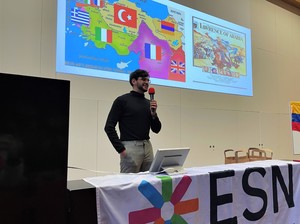 There are dozens of student organisations and associations uniting hundreds of active students throughout eight faculties at Palacký University Olomouc.
There are dozens of student organisations and associations uniting hundreds of active students throughout eight faculties at Palacký University Olomouc.
These organizations cover a wide variety of interests and fields, from cultural and sports clubs to academic and professional societies. With such a diverse array of student organizations, Palacký University offers ample opportunities for students to explore their passions, connect with like-minded individuals, and develop their leadership and teamwork skills.
Sustainable University
 Sustainable development is a pivotal principle of how Palacký University Olomouc is navigating through the 21st century. Evident climate and the accelerating development of technologies and innovations changes.
Sustainable development is a pivotal principle of how Palacký University Olomouc is navigating through the 21st century. Evident climate and the accelerating development of technologies and innovations changes.
The trends in the evolution of global, European, and Czech society develop and form the initial framework for the dynamics of change at our university. These factors co-create an environment of influences, potentials, opportunities, and threats to which Palacký University Olomouc consciously responds in 2021 by starting to make deliberate, targeted, and systematic decisions that are directly and explicitly related to sustainable development.
Further information regarding the support, development of sustainability, possible engagement and more can be found on the Sustainable University website.
Volunteering Centre
 We believe that students should be active citizens, and volunteering represents an opportunity to change the world around you. Our Volunteering Centre is the first Czech university centre that unites active students and arranges volunteer opportunities for them. The Centre helps UP students and employees to become acquainted with the opportunities organisations are presenting. It also supports gaining experience in coordinating help to others.
We believe that students should be active citizens, and volunteering represents an opportunity to change the world around you. Our Volunteering Centre is the first Czech university centre that unites active students and arranges volunteer opportunities for them. The Centre helps UP students and employees to become acquainted with the opportunities organisations are presenting. It also supports gaining experience in coordinating help to others.
The focus of Volunteering Centre is:
- to support volunteering as an opportunity for self-development and to gain experience
- to coordinate requests for volunteering and to offer volunteers for and by UP students and employees
- to educate in the area of expert, legal and personal questions related to volunteering activities
- to register and evaluate the volunteering activities of UP students and employees
If you wish to join Volunteering Centre in their activities and get the opportunity to change the world around you contact Nika Tótová at nika.totova01@upol.cz.
Career Centre
Do you want to participate in interesting activities and also invest in your future? Or would you like to start building your career right now? Then you should check out the Career Centre, located in the Zbrojnice/Armoury. It holds various seminars, workshops, lectures, and also offers work opportunities and internships. And you can also try a mock job interview!
Legal Counselling

If you need legal help but hiring a professional lawyer would be a bit challenging to manage moneywise, the Faculty of Law offers the services of their students to the students of Palacký University. Student’s Legal Aid Office focuses on a wide range of legal issues, most often in the fields of civil law, family law, executions, and insolvencies. Supervisors who oversee the elaboration of a particular piece of legal advice are always experts in the field of law to which the particular case belongs. For more information, see the Student's Legal Aid Office web page.
E-mail: studentskapravniporadna@upol.cz | Telephone: +420 585 637 616 |
Who’s who at UP?
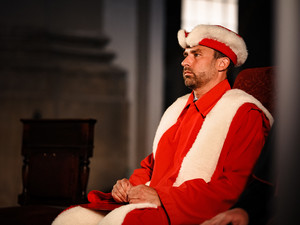 Dean, Senator, Professor Emeritus, Academic Senate and Senators? These are some of the terms you will hear at UP on a daily basis. Who’s who? Here we explain some of the main positions and what they do. Hopefully, this will save you some time and prevent some misunderstandings. Before we start, it is good to know that Palacký University consists of the Rector’s Office, eight faculties, and facilities such as dormitories, dining halls, and libraries.
Dean, Senator, Professor Emeritus, Academic Senate and Senators? These are some of the terms you will hear at UP on a daily basis. Who’s who? Here we explain some of the main positions and what they do. Hopefully, this will save you some time and prevent some misunderstandings. Before we start, it is good to know that Palacký University consists of the Rector’s Office, eight faculties, and facilities such as dormitories, dining halls, and libraries.
Rector
The rector is the head of the university. Doc. JUDr. Michael Kohajda, Ph.D. was elected in 2025 and will serve for the next three years. The Rector is elected by the UP Academic Senate and confirmed by the president of the Czech Republic. He represents the university not only in the Czech Republic, but also abroad.
Vice-Rectors
Vice-Rectors are the Rector’s closest associates, who assist him with running the university. The most important for you is the Vice-Rector for Regional and Student Affairs who is, among others, the head of the Communications Office and student organisations, and deals with events such as the Májales Student May Festival and MEET UP. Additionally, the Vice-Rector for Education deals with, e.g. fees for extended studies.
running the university. The most important for you is the Vice-Rector for Regional and Student Affairs who is, among others, the head of the Communications Office and student organisations, and deals with events such as the Májales Student May Festival and MEET UP. Additionally, the Vice-Rector for Education deals with, e.g. fees for extended studies.
Bursar
The bursar is a university academic administrative officer who deals with internal university administration and acts on its behalf accordingly to the powers given to them by the rector and the internal regulations of the university. The bursar is appointed and removed by the rector for an indefinite period. The office is similar to the Faculty Secretary under the authority of the dean. The current bursar is Ing. Josef Suchánek.
Dean
 The dean has similar powers to the rector, but only within the given faculty. The dean, among other things, decides on admission or non-admission of students, granting scholarships, and accepting credits from previous studies. The dean also presides at matriculation, commencement, and other events.
The dean has similar powers to the rector, but only within the given faculty. The dean, among other things, decides on admission or non-admission of students, granting scholarships, and accepting credits from previous studies. The dean also presides at matriculation, commencement, and other events.
Vice-Dean
The powers of the vice-dean are similar to the powers of vice-rectors but only within the given faculty. Vice-deans deal with individual sectors of faculty management, student affairs, and foreign agenda. The most important for you is the Vice-Dean for Studies, under whom falls the Student Affairs Office.
UP Academic Senate
 The Academic Senate is an independent representative body which deals with inner regulations, the budget, annual reports, controls management and decides on proposed candidates for Rector. UP AS also deals with matters that are closely related to students themselves, e.g. dormitory fees. UP AS currently has 24 members; three members from each faculty – two employees and one student.
The Academic Senate is an independent representative body which deals with inner regulations, the budget, annual reports, controls management and decides on proposed candidates for Rector. UP AS also deals with matters that are closely related to students themselves, e.g. dormitory fees. UP AS currently has 24 members; three members from each faculty – two employees and one student.
Faculty Academic Senates
The Faculty Senate is also an independent representative body but deals only with matters within the faculty. Similarly, faculty senates deal with internal regulations, budgets and annual reports, control management and decide on proposed candidates for appointing Deans (heads of each faculty). Each faculty senate has its own web page, where you can find the times and minutes of meetings and other things related to the senate. If there is a problem, senators might be able to solve, do not hesitate to contact them.
Senators
In the Czech Republic, each university and each faculty has a high degree of autonomy and self-management. This autonomy is represented by the UP Academic Senate of UP and the academic senate of each faculty. You should know that each of these senates is made up of one-third students and two-thirds employees. This means that you can vote and run for the office. You can also approach student senators with suggestions and questions and they might raise your matter at the Academic Senate meeting.
Ombudsman
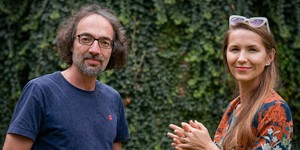 Each faculty should have its own ombudsman, which is a fairly new position, so far only represented at the Faculty of Arts and the Faculty of Science. The ombudsman is an independently elected person, who sees to it that the rights of the students are not violated and protects students against unjust or unfair treatment.
Each faculty should have its own ombudsman, which is a fairly new position, so far only represented at the Faculty of Arts and the Faculty of Science. The ombudsman is an independently elected person, who sees to it that the rights of the students are not violated and protects students against unjust or unfair treatment.
Student Affairs Officer
Each faculty has its own Student Affairs Office, which helps students with various problems concerning their studies. There is a student affairs officer for each programme and sometimes even for each year. So get to know your appropriate officer(s)!
Degrees
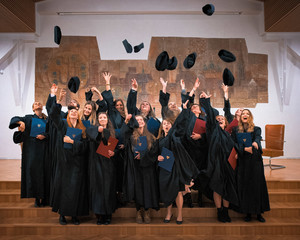 The document features a detailed table that outlines a variety of university degrees and their meanings. It serves as a guide for understanding the different academic qualifications and their relevance in higher education and professional fields. This table aims to help students and professionals navigate the complexities of university degrees effectively.
The document features a detailed table that outlines a variety of university degrees and their meanings. It serves as a guide for understanding the different academic qualifications and their relevance in higher education and professional fields. This table aims to help students and professionals navigate the complexities of university degrees effectively.
Also available in PDF.
Dis. Certified Specialist (a graduate of higher education)
BcA. Bachelor’s degree in arts
Bc. (B.Sc./BA) Bachelor’s degree
Mgr. (M.Sc./MA) Master’s degree
Ing. (M.Sc.) Engineer
Ing. arch. Architectural Engineer
MUDr. (M.D.) Doctor of Medicine
MVDr. (D.V.M.) Doctor of Veterinary Medicine
MDDr. (D.M.D) Doctor of Dental Medicine
JUDr. (J.D.) Juris doctor – Doctor of Law
PaedDr. (Ed.D.) Doctor of Education
PhMr. Master of Pharmacy
PhDr. (M.A.) Doctor of Philosophy
PhD. Doctor of Philosophy
RNDr. (M.A.) Doctor of Natural Sciences
Th.D. (Pharm.D.) Doctor of Pharmacy
ThDr. Doctor of Theology
ThLic. Licentiate of Theology
Dr. (CSc.) Doctor (title from the 1990s, replaced with Ph.D.)
as. Assistant (the lowest academic post)
odb. as. Assistant Professor
doc. (Assoc. Prof.) Associate Professor
prof. Professor (in Czech a degree, not a profession)
emer. prof. Professor Emeritus
Dr.h.c. Doctor Honoris Causa - honorary degree for the merit of science or country
DSc./DrSc. degree corresponding with today’s Doctor of Science
CSc. Candidate of Science, former degree, no longer used
MBA Master of business administration
BA/MA Bachelor/Master of Arts (at foreign universities)
akad. mal. Academic painter (similarly sculptor or architect)
Lektor/ka Lecturer – Professional worker, usually with a lot of experience
Glossary of useful terms
The document contains explanations for terms and expressions associated with university life. It serves as a resource for understanding the specialized vocabulary of higher education.
Also available in PDF.
Attendance sheet
The secret weapon of all teachers. Forever silent, though it tells the stories the students rather no one knew. It can tell how interested you are in whichever course it arms. It tells if you have to make an additional assignment, special essay, or presentation.
Bachelor’s Degree Programme – Bc. – BA
Academic degree – it usually takes 3 to 4 years to complete by passing the state exam and successfully defending one’s thesis, after which the student obtains the degree Bc.
Colloquium
An exam made easy. You mostly sit, nod, and from time to time say something smart. If you sound smart enough, you get a pass; if not, then prepare for the next term. The colloquium is usually an examination of multiple students. This means a kind of competition between them for who will pass and who will not.
Credit minimum
Fulfilling the credit minimum at the end of the year = the minimal amount of credits needed to complete the study year.
Credits
Forget the casual grading system from your high school. At UP, the success of one’s study is rated not only by grades but also by credits. Students obtain credits after completing courses, seminars, or lectures. Don’t forget to check your credit minimum in order to pass the year.
Credit test
By the teachers’ measurements, an easy and quick test. For most students – a painful written exam, often followed by a spoken exam.
Dean’s holiday
On special occasions and events for faculty; students enjoy a day or, in most cases, a half-day off.
Department
The place of utmost importance to you – here you will be meeting all your friends and teachers during your seminars or lectures.
Quick Tip: Professor, in Czech the highest academic degree, is the term used in Czech high schools for all teachers. However, at the university, this term is used only to address people with this particular degree.
Diploma thesis (Bachelor’s/Master’s)
An integral part of your third year or last study semester at university… and no, you won’t write it in a fortnight (it is a lot of pages). Before even submitting, you have to choose a fitting topic for your thesis. The defence takes place in front of a commission and is usually a necessary step before attempting the state exam.
DMS
The IT system used for the administration of electronic or digitalized paper documents.
Elective course
Sometimes labelled as a “B” course, each department offers students several courses from this category. Each student has to complete several of these to complete their study plan.
Essay
Based on reflections, sometimes supported by arguments and expertise. At other times an essay can be more narrative. The essay’s genre/type is usually assigned by the teacher.
Exam
Usually connected to “A” courses, exams can have an oral or written form, sometimes both. To be able to attend the exam, it is necessary to enrol into it via STAG.
Examination period
The period following the semester during which students has to fulfil their study obligations (exams, credit tests, colloquiums).
Full-time study
The form of study based on student’s attendance in the lessons and direct contact with the teacher.
Graduation ceremony
The day of your graduation – the world suddenly becomes much happier. It is a festive event for this reason… each bouquet costs twice as much as usual and you have to look twice as happy in front of the camera.
Incentive and Merit scholarship
Scholarship awarded to students with excellent grades. The amount differs at each respective faculty, but it’s good to know about and maybe try getting one.
ISIC – Student Identification Card
Every student should have an ISIC card, worth its weight in gold. It enables its owner to borrow books, visit UP leisure facilities, have lunch at the canteen, print photocopies, or prove that you have the right to a student discount outside UP.
Lecture
Lasts from 45 to 90 minutes and deals with the given topics and lessons.
Master’s Degree Programme
Educates the student in theoretical areas of the field. These are based on science, knowledge and development. Usually follows the Bachelor’s study programme and takes two to three years to complete (so-called Follow-up Master’s programme). But there are also Continuous Master’s programmes, e.g. in law and medicine, which take from four to six years. After fulfilling all the requirements and completing the study, the graduate obtains the MA degree (differs at some faculties, e.g. FDM, MUDr. degrees).
Matriculation
Proper initiation into the Student Order, during which students take an oath to fulfil their study obligations. It is a formal affair, which means formal wear. Today, only a few faculties maintain this custom.
Obligatory course
Sometimes labelled as an “A” course, students must complete it during their studies.
Optional course
Sometimes labelled as a “C” course, each student can choose from a list outside their department which one they want to attend, if any. Some of the usual topics are film, religion, philosophy, theatre, in some cases excursions, or a sports stay or trip (e.g. FL, FPC, FS).
Paper
Assignment closely related to the recommended literature listed in the syllable of each course and is usually discussed during the first few lessons.
Part-time Study
The combination of full-time and distance study.
PhD. Programme – Doctoral Studies
Follows a master’s degree programme and focuses on scientific research and independent activity in the field of research and development linked to publishing activities or independent creative work in the field of art. The standard study period is three to four years. The graduate obtains the degree of “Doctor” (PhD, listed after one’s name). If the student studied at the Faculty of Theology, they are awarded a Doctor of Theology (ThDr.) degree.
Plagiarism
You should know that copying has no place at the university, particularly on your diploma thesis. The university has special software for detecting plagiarism and sanctions are harsh.
Rector’s holiday
Holiday issued by the Rector, usually twice a year on special occasions, e.g. Sports Day or the Májales Student May Festival. The holiday applies to all faculties.
Seminar
An extension to the lectures, here the theoretical knowledge is applied in hands-on training. Come on students, confess, which of you haven’t read the assignment?
Seminar paper
Written on a selected topic in most courses, usually necessary for completing the course or for admission to the examination. There are given rules for each assignment, and it is necessary to follow these to pass (and no plagiarism!).
Social scholarship
For those less well-off: there are several criteria for obtaining this scholarship. Obtainment starts with the student’s initiative. You have to enter your bank account number into STAG (one bank account can be used for more scholarships), submit an online application (again in STAG), and you need the relevant confirmation from the Social Office from the place of your permanent residence. Please note that not everybody meets the conditions to obtain a social scholarship. Forward the confirmation to the officer for social and accommodation scholarships at the Rector’s Office.
STAG
The IT system through which you enrol in courses. It has an easy-to-grasp interface, accessible from the UP Portal, which means that you can use it from school or home and make your life much easier. And no, it has nothing to do with deer.
Student Certificate
Issued by the Student Affairs Office and valid for one year. Most students need it at the beginning or end of the academic year (for work, taxes, tax credits, etc.) The good thing is that it can be issued online.
Study obligations control
Takes place in cooperation with individual student affairs offices. The form differs at each faculty.
Summer Semester
From February to May. Be wary of the change to daylight savings time in March, waking can prove substantially harder after it.
Syllabus
Your guide through the course. It shows the name of the teacher, the contents of the course, and further specifications, student requirements, and recommended literature.
UP Portal
Internal website – portal.upol.cz – where you can find most of the information you need about your studies to date, access your university e-mail account, read daily news from UP and also from around the world, and links to important documents as well as services offered by the university.
Academic calendar
The academic year is divided into two semesters. Each semester is 13 weeks long. Winter semester starts in late September; in the last week before Christmas there are no classes because it is a “credit week”, which is one week of mostly written tests which are either a completion of the courses themselves or a prerequisite of registering for an oral exam in the exam period. The exam period goes on through January until mid-February. The summer semester runs from mid-February to mid-May. The last week is again a credit week, with the exam period lasting until the end of June.
The academic year starts on 1 September 2024 and ends on 31 August 2025. The winter semester classes end before Christmas. Exams are scheduled throughout January. The summer semester begins in the middle of February and classes end in the middle of May with exams continuing until the end of June. With approval from respective departments, students can take examinations also before the official examination period
Arrival at the dormitories | 8 - 10 September 2025 |
Winter semester (beginning of classes) | 19 September 2025 |
Winter semester (end of classes) | 19 December 2025 |
Orientation week Summer Semester | To be announced |
Christmas break | 20 December 2025 - 1 January 2026 |
Examination period begins | 1 January 2026 |
Examination period ends | 5 February 2026 |
Arrival at the dormitories | 2 – 4 February 2025 |
Orientation week Summer semester (for Erasmus+ and Exchange students) | To be announced |
Summer semester (beginning of classes) | 6 February 2026 |
Summer semester (end of classes) | 9 May 2026 |
Palacký University Olomouc Academic Week | 16 - 22 February 2026 |
Sports Days | 13 May 2026 (Rector's holiday) |
Examination period begins | 10 May 2026 |
Examination period ends | 30 June 2026 |
The academic calendar above is general for the whole university and might differ for particular faculties, especially for the FHS nad FMD whose calendars are listed bellow.
Academic Calendar for Faculty of Health Sciences
Academic Calendar for Faculty of Medicine and Dentistry
Public holidays
Public holidays in the Czech Republic are days of national significance and are observed by the government and businesses throughout the country. These holidays are an important part of Czech culture and are usually associated with religious, historical, or cultural events.
On these days, some of the government offices, banks, schools, and many businesses are closed, and public transportation operates on a reduced schedule. Many Czechs use these days as an opportunity to spend time with family and friends, attend church services or cultural events, or participate in traditional celebrations.
Overall, public holidays in the Czech Republic play an important role in preserving the country's cultural heritage and provide an opportunity for Czechs to come together to celebrate and reflect on their history and traditions.
Restoration Day of the Independent Czech State, New Year's Day | Den obnovy samostatného českého státu, Nový rok | 1 January |
Good Friday | Velký pátek | 29 March (for 2024) |
Easter Monday | Velikonoční pondělí | 1 April (for 2024) |
Labour Day | Svátek práce | 1 May |
Victory Day | Den vítězství | 8 May |
Saints Cyril and Methodius Day | Den slovanských věrozvěstů Cyrila a Metoděje | 5 July |
Jan Hus Day | Den upálení mistra Jana Husa | 6 July |
Statehood Day | Den české státnosti | 28 September |
Independence Day | Den vzniku samostatného československého státu | 28 October |
Struggle for Freedom and Democracy Day | Den boje za svobodu a demokracii | 17 November |
Christmas Eve | Štědrý den | 24 December |
Christmas Day | 1. svátek vánoční | 25 December |
St. Stephen´s Day | 2. svátek vánoční | 26 December |